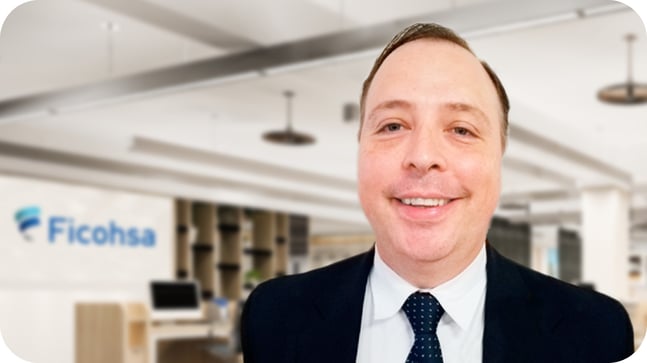 5 min.
read
5 min.
read

After graduating as an Industrial Engineer and managing the relationship with banks in an electric company, Rodrigo Soler, took a leap and switched to the financial sector, where he's spent his day to day for more than 15 years now. In February 2019 he joined Grupo Ficohsa, with the great challenge of implementing the Bank's digital transformation strategy in Honduras, Nicaragua, and Guatemala. He was recently awarded by Fintech Americas with a gold in the Social Impact Innovation category. In this interview, he discusses the path traveled, the opportunities and the main issues that are on the agenda of the sector.
TO GET TO THE MOON YOU HAVE TO GET TO SPACE FIRSTIC : How were your beginnings in the financial sector?
RS: It was in Grupo Financiero Uno. A group with regional presence that was absorbed by Citibank together with Banco Custatlán. The integration process was long. The original project of the card processor change was planned for 6 months, but it took 6 years! After Citibank announced its exit from consumer banking in the region, Ficohsa acquired operations in Honduras and Nicaragua.IC: At what stage would you say Ficohsa is in relation to digital transformation?
RS: We are in an accelerated digitization process. We want customers to recognize us as the Bank that has the best offer in the countries where we operate. We have been working on improving the customer experience and, according to our surveys and measurements, our results have been improving.
IC: How has the transactional chatbot project that you carried out with Infocorp and for which you received the recognition of Fintech Americas impacted the bank and customers?
RS: In the partnership with Infocorp, we have worked on the evolution of a chatbot that allowed us to impact at the level of the entire project management, through an agile methodology. We implemented it first on Twitter and Facebook Messenger and then on WhatsApp. This integration of WhatsApp, the reuse of services and the concept of omnichannel were the foundations for exponential growth: more than 70% growth vs. the pre-pandemic. We didn't really expect these numbers. We have over 250,000 customers regionally using the chatbot every month and the number of transactions and queries continues to grow.
IC: Of the three channels, which is the most used and in what proportion?
RS:WhatsApp is definitely our customers’ preferred channel. Actually, we've seen a percentage of customers who have migrated from Twitter or Facebook to that channel. Currently 80% of customers using SARA[1] do it through WhatsApp.
IC: What is missing or what is needed for more customers to start adopting the chatbot?
RS: Time mainly. There is a significant number of our customers who prefer to make their inquiries, payments and transfers through the web channel, which we also create with Infocorp. And there is a large percentage of customers using both channels.
IC: Is digital acceleration still a challenge for Ficohsa or what do you think is currently the main challenge for the bank?
RS: Digital is not something important, but a necessity. The financial industry has as its main challenge to achieve an excellent user experience without neglecting its security, since often security does not go hand in hand with ease. The challenge is to strike a balance, a healthy balance between something safe and super friendly. Communication is another challenge for us. Grupo Financiero Ficohsa has presence in four Central American countries and, although we are neighbors, each one has its own customs, its own regulation, and particularities in the way we communicate.
IC: If you had to share a learning from this process with colleagues, what would it be?
RS: Actually, the greatest learning has come from the best teacher or judge: the customers. We listen to them and give them the attention they deserve, since they are the ones who tell you your mistakes and what they would like to improve. Another thing I could also recommend is that, when starting a project, make progress little by little with incremental improvements. Don't try to do everything at once! I'm going to give you the example of NASA: when NASA landed on the moon, it had three projects: the Mercury project, the Gemini project and finally the Apollo project. The first was not to reach the moon, the goal was to reach space. Then, in the second group of rockets it was, ok, we already got into space and now we're going to go around in orbit and then get to the moon. So, if I want to get to the moon, I don't have to go from zero to the moon, but I must go little by little, each time doing things better and each time putting the stick higher.
IC: How much have people adapted to new channels?
RS: The pandemic has shown something key, there are two types of customers: some who adopt everything new very quickly and others who are more conservative in the face of these changes. But they are all customers, so we must follow each one's rhythm.
IC: How would you define the relationship with Infocorp?
RS: Infocorp gives us a lot of added value, in the sense that it has enormous expertise in the management of the financial and digital arena. The evolution of the platform comes not only from Bank initiatives, but also from constant communication with Infocorp Product experts, who bring us best practices and new trends. We value very much all the learning that has been shared and that saves us many tests and bugs.
We work together with Infocorp with the team of SEA (Software Evolution Area), product and chatbot. With each team we have at least one weekly call to see roadmaps, to have an update on the whole line of evolution. And apart from that, when I get a WhatsApp message with a number that starts with the area code 598 is because I know where it comes from, so we also have a lot of communication also by WhatsApp.
Thanks to the partnership we have with Infocorp, customers recognize us as one of the leading digital banks in the region.
IC: How do you imagine the technology and digital transformation of banks in ten years?
RS: I believe that the concept of financial intermediation will always exist. What will definitely change is how it is done. Physical money is disappearing, as well as credit cards. Now everything is through devices such as cell phones. Definitely, all payment methods will be 100% digital. Another thing that I am sure will change is the request for products and attention: it will also be through electronic means. I don't think traditional attention channels are going back to the way they were before.
IC: Can you imagine what role Banks will have in relation to cryptocurrencies?
RS: I would love to have the crystal ball, but I don't (laughter). Remember that banks are ultimately regulated entities, and they go hand in hand with laws and governments. So in this kind of cutting-edge products, are the banks going to participate? Yes, but they will always be closely accompanied by all the regulators in their countries.
IC: On a personal level, what are the areas of work that you like or dislike the most?
RS: I love the concept of getting better, the challenge of always having a better version of the services and the platforms.
Achieving common agreement between all branches of business is the most difficult part, not that I dislike it, but aligning all stakeholders is a great challenge. Because in all 4 countries they have the same product and we want to provide customers with the same quality and the same service, no matter where they are geographically located. We want the experience to be the same.
IC: Is internal culture a barrier to digital advancement at Ficohsa?
RS: No, on the contrary, the whole guideline is the one that drives growth and digitalization the most. We know that now digital channels are the tool that will maintain your relationship with the bank, they are no longer merely transactional.
IC: What do you like to do in your free time?
RS: I am a baseball fan; I like to watch professional games and practice every so often on weekends. I also like to watch Netflix docuseries with historical content, one can learn a lot by watching.
IC: Would you recommend one?
RS: I recommend Lupin. It is about the fascination of a white-glove thief who proposes to avenge the injustice suffered by his father.
[1] SARA: Agile Automatic Response Service-Ficohsa Chatbot


